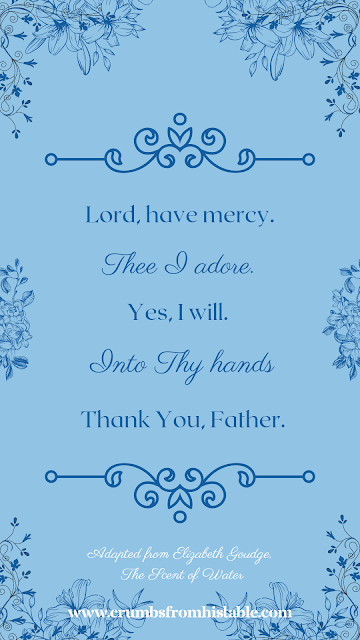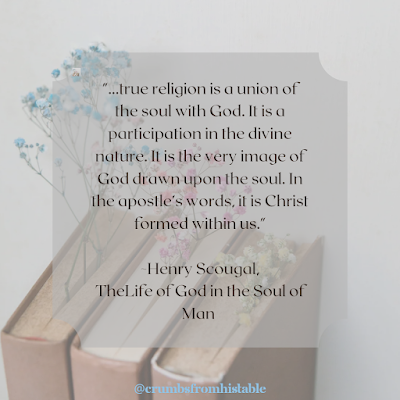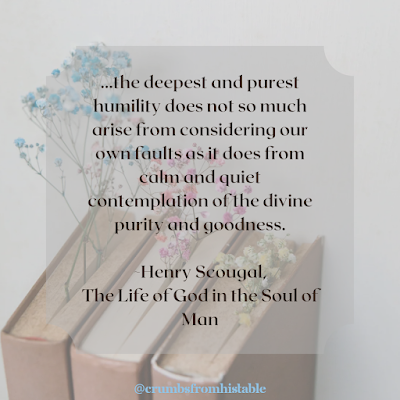Thursday, July 21, 2022
Dear Me Letter
Sunday, July 17, 2022
A Meal in Six Words
 |
| Morning summer sky, July 2022 |
Sunday, July 10, 2022
The Life of God in the Soul of Man {Book Review}
 |
| "The worth and excellency of a soul is to be measured by the object of its love" (Henry Scougal, The Life of God in the Soul of Man). |
To them God chose to make known how great among the Gentiles are the riches of the glory of this mystery, which is Christ in you, the hope of glory" ( Colossians 1:27, ESV).
In a Nutshell
Henry Who?
What's It About?
True religion is quite another thing. Those who are acquainted with it will entertain far different thoughts about it and avoid all false imitations of it. They know by experience that true religion is a union of the soul with God. It is a participation in the divine nature. It is the very image of God drawn upon the soul. In the apostle’s words, it is Christ formed within us. In short, I do not know how the nature of religion can be more fully expressed than by calling it a divine life (Kindle location 137-154).
Again a little farther on, he writes, "Religion is a reflection of the divine perfections, the image of the Almighty shining in the soul of man. It is a real participation of his nature. It is a beam of the eternal light, a drop of that infinite ocean of goodness. And those who are endowed with it can be said to have God dwelling in their souls and Christ formed within them" (188).
This life, as he describes it (and I believe his thoughts conform to the Scriptures), is a life of mutual love between God and the Christian and between the Christian and his brother or neighbor; of holiness, since the holy Christ formed in us through the Holy Spirit makes us like the holy God; of humility, as we see our lives in the light of God's perfect holiness; of prayer.
Why Read It?
Perfect love is a kind of self-dereliction, an emptying out of ourselves. It is a kind of voluntary death wherein the lover dies to themselves and all their own interests, neither thinking nor caring about themselves any more, and being mindful of nothing other than how they may please and gratify the person whom they love. Thus they are quite undone unless they meet with reciprocal affection.… The God-directed lover has an unspeakable advantage, having placed his affection on him whose nature is love. For if God’s goodness is as infinite as his being, and his mercy saved us when we were his enemies, how can God not but choose to embrace us when we have become his friends! It is utterly impossible that he should deny his love to a soul who is wholly devoted to him and desires to serve and please him. He cannot disdain his own image nor the heart in which it is engraved. Love is the only tribute that we can pay him. It is the sacrifice that he cannot despise.… how happy are those who have placed their love on him who can never be absent from them! They only need to open their eyes and they may behold the traces of his presence and glory everywhere. To be able to converse in an instant with him whom their souls love transforms the darkest prison or wildest desert, making them not only bearable but almost delightful (450-466).
 |
The paragraph Nancy Wolgemuth quoted is no less lovely:
Let us consider the love and affection by which holy souls are united with God so that we may see the excellence and happiness that result from it. Love is the powerful and prevailing passion by which all of a person’s inclinations should be determined and on which perfection and happiness depend. The worth and excellency of a soul is to be measured by the object of its love (398).
While my edition came from Crossway and included a helpful foreword, a bit of subtle updating of language, and a Scripture index, free versions are available, given that the original is in the public domain. In my opinion, reading Scougal's small book amply repays the investment of time required, and should you disagree, you won't have lost much.
Potential Pitfalls
The Bottom Line
The Life of God in the Soul of Man is a beautiful little book on living the Christian life. Henry Scougal was an old soul indeed to have written such a gem of a treatise in his twenties. It is truly too glorious and beautiful and true to take in fully at one reading. This is a book worth returning to again and again and taking into one's heart. I hope you read it too. If you do, and if this review influenced that decision, please come back and let me know how you got on.
Tuesday, July 5, 2022
The Italian Ballerina {Book Review}
"So if God is behind something as small as an old suitcase coming to light, I could believe He’s looking for ways to heal us in our brokenness. And certainly to be there with us in our grief” (The Italian Ballerina, Kindle location 2583).
Brokenness and beauty.
Grace and grit.
Grief and growth.
Prodigal sons and an orphaned child.
Love willing to lay down its life for a stranger or a friend.
These are some of the central themes of the new World War II novel, The Italian Ballerina, by Kristy Cambron. This is a dual-timeline story, with the Italian ballerina of the title supplying the hinge connecting the two eras. This is a fun, sweet romance by a Christian author, but it is not preachy at all and should appeal to a general audience as well as the Christian book market. A literary vacation lies within its pages.

The Dance Class by Edgar Degas, public domain, from Wikimedia Commons
In the modern timeline, journalist “between pens” Delaney Coleman travels to Tivoli, near Rome, to deliver a child’s suitcase, mysteriously found among her recently deceased grandfather’s belongings, to an elderly ballerina who claims to be its rightful owner. The story of both the combat-medic grandfather and the ballerina unfolds in the World War II timeline. Love blooms in both. The unanswered questions and mysteries keep the pages turning; Cambron times the big reveals well to keep the reader guessing but not frustrated.
At the same time, the novel draws attention to a real historical rescue operation in which three hospital doctors and a priest in Rome invented a highly contagious terminal disease, Syndrome K, in order to rescue as many Jews as possible from the Holocaust. The city and hospital were occupied by Nazi troops, yet these brave men hid the rescued ones right under the soldiers’ noses. (Some of the discussions of masking and how contagious the disease struck me as ironic given the book’s pandemic publication.)
For me, the ballet parts of the tale were especially nostalgic. So many life lessons are learned through the arts, so many heartaches soothed. My dearest interests in childhood were books, ballet, and piano. If I wasn’t practicing ballet in the front hallway to my album of piano music for ballet practice, there was a good chance I was reading books about ballet and the history of ballet. In third grade I did a book report on a biography of English prima ballerina Margot Fonteyn and a yearlong project on Fonteyn and Native American prima ballerina Maria Tallchief. Consequently, the mentions of Sadler’s Wells, the Old Vic, and Covent Garden, and even the dropping of Dame Margot’s name, were lovely connections to my childhood. My mind’s eye can see how British ballerina Julia Bradbury and Calla Santini move because I lived in that world for a decade.
For my reading habits, this is not likely a book I will return to again and again, but it is a delightful (and clean) escape for readers who enjoy stories set in World War II, tales of courage real and fictional, the ballet, Christian romance, and classic films (especially Roman Holiday). (It also has the makings of a beautiful movie.) Books with a similar sensibility include The Guernsey Literary and Potato Peel Pie Society, Before We Were Yours, and Eternal. There is some wartime violence described when necessary to the plot. If you, like me, can’t take a summer vacation (again), this novel might just be the cold glass of lemonade needed to cheer your soul.
Full disclosure: I received a complimentary NetGalley copy of this book prior to publication in exchange for an honest review.
Amazon Affiliate purchase link, if you would like to drop a few coins in my tip jar at no added cost to you:
This book releases July 12, 2022.












